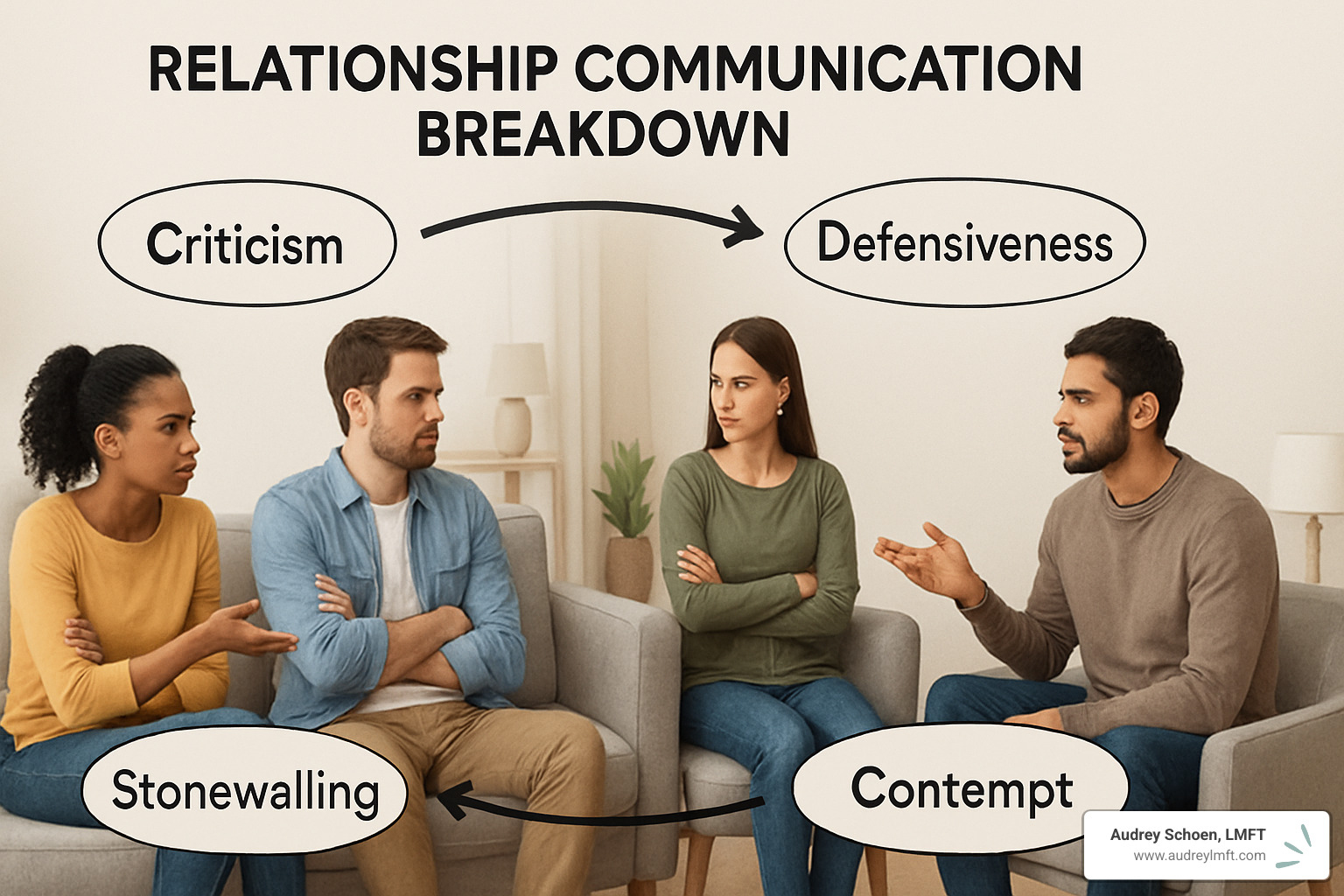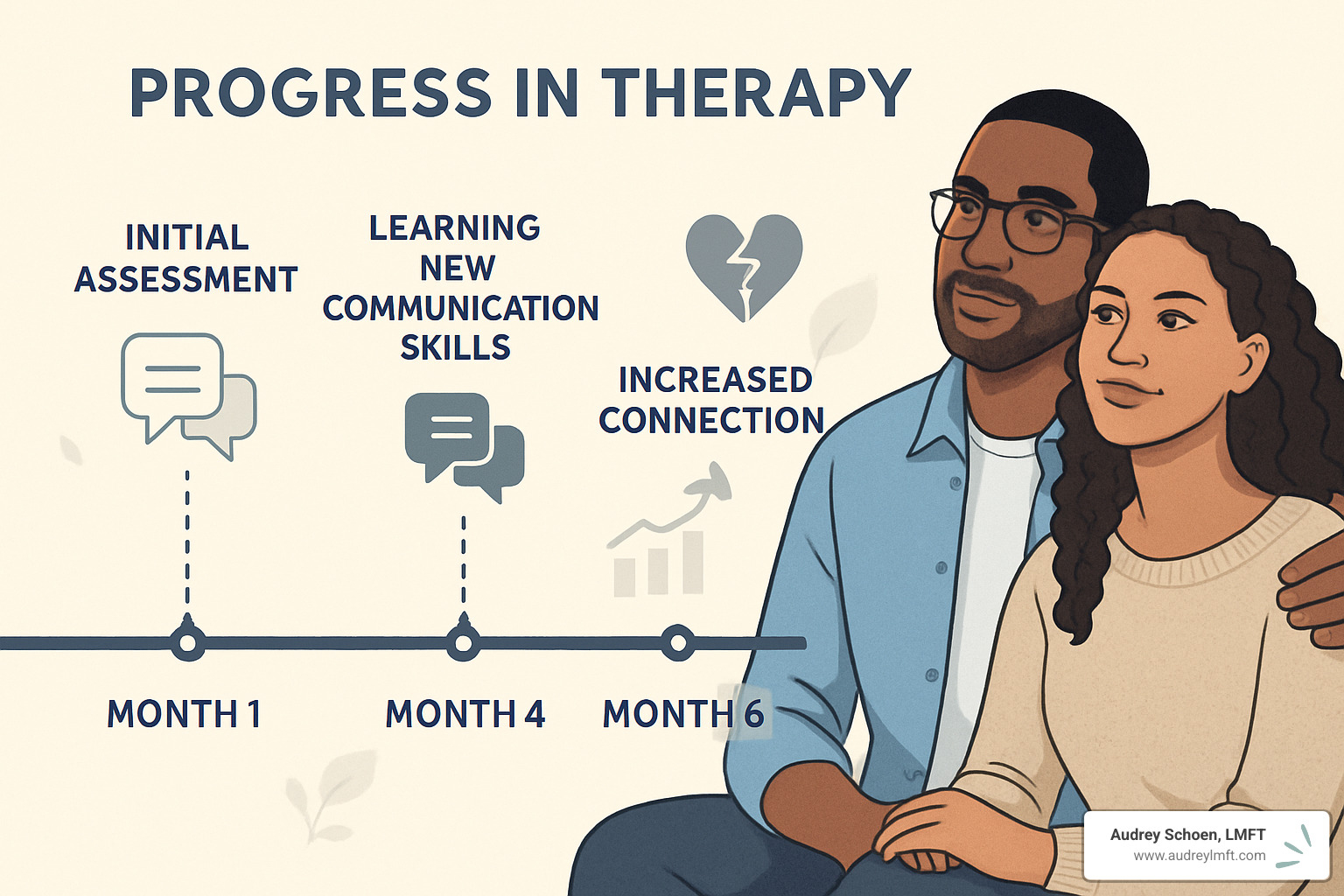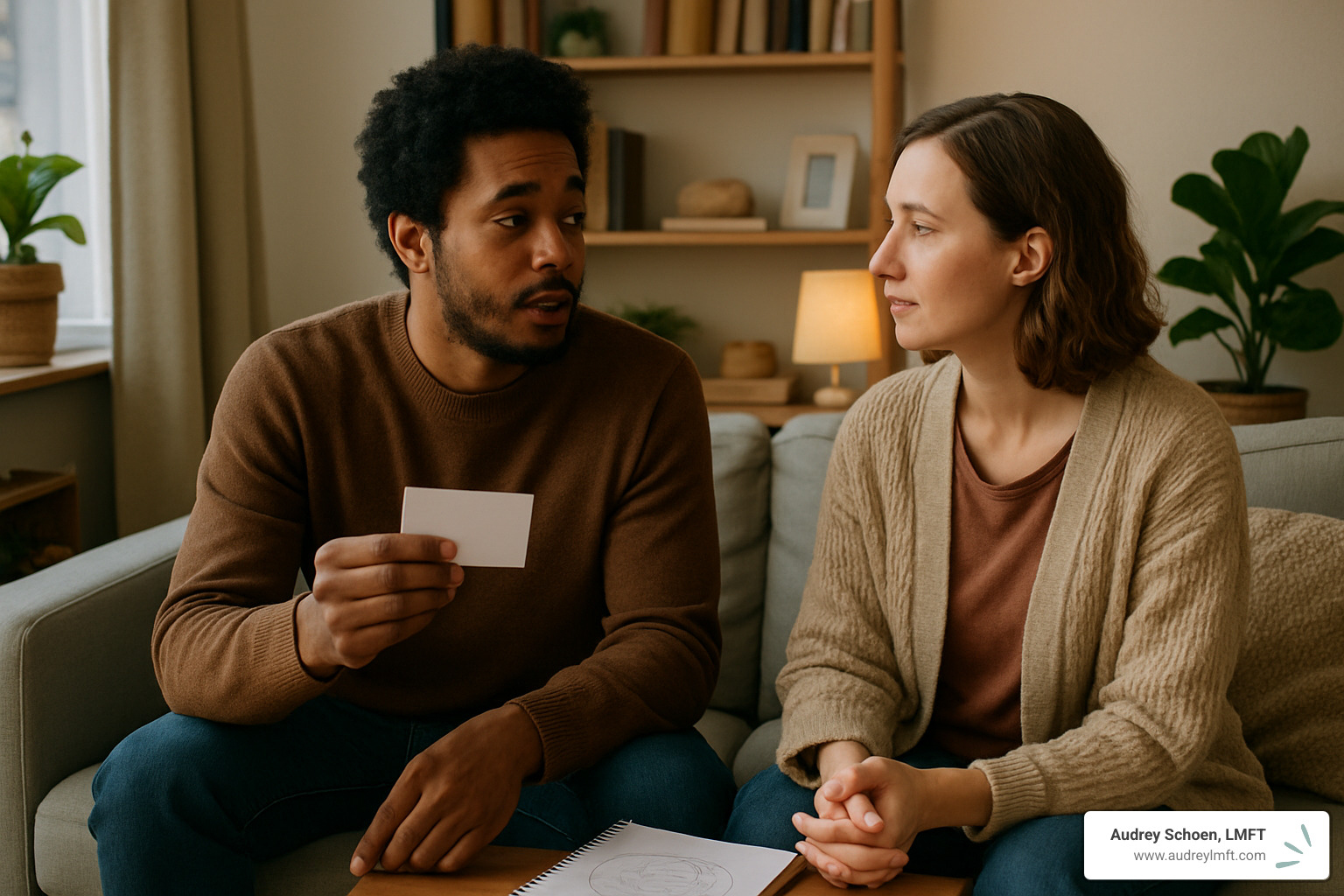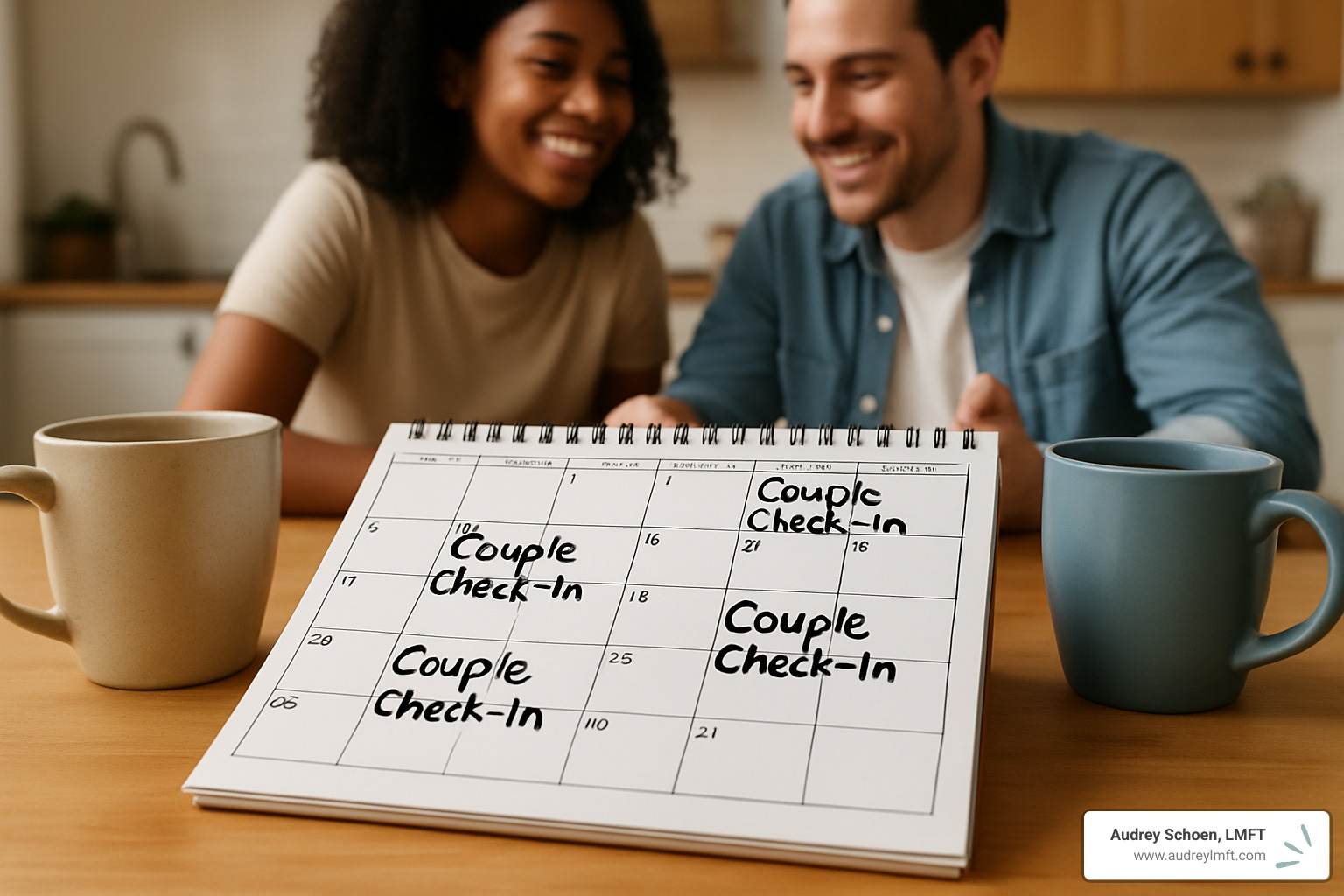Communication Counseling for Couples That Actually Works (No, Really!)

Why Your Relationship Deserves Better Than "Just Communicate More"
Communication counseling for couples is a specialized form of couples therapy that helps romantic partners identify and change the underlying patterns, triggers, and internal narratives that create communication breakdowns in their relationship. Through evidence-based techniques and personalized treatment, couples learn to move beyond surface-level communication tips to address the deeper emotional and psychological roots of their conflicts.
What Couples Counseling for Communication Includes:
- Assessment of communication patterns, communication styles, and triggers
- Training in evidence-based dialogue techniques and communication exercises
- Exploration of internal narratives affecting interactions
- Practice with conflict resolution tools like the feedback wheel
- Development of emotional regulation skills and active listening abilities
- Customized homework, exercises for couples, and maintenance strategies
- Focus on fostering healthy relationships, emotional intimacy, and long-term connection
You know the drill. Every relationship article tells you to "communicate better" or "use I-statements." You've probably tried those tips. Maybe they worked for a week or two before you found yourselves back in the same frustrating cycles.
At Audrey Schoen, LMFT, I understand how exhausting it can feel to hear the same old advice—"just communicate better" or "try I-statements." If you’ve already given those tips a shot and still find yourselves stuck in the same patterns, you’re not alone. As a solo practitioner, I see couples every day who want real, lasting change—not just quick fixes.
Here's what most advice misses: the real communication problems aren't about your communication skills. It's the automatic, unconscious processes happening beneath the surface. Those internal narratives telling you your partner doesn't care. The stress responses that kick in before you even realize you're triggered. The patterns you learned growing up that show up in your relationship today.
Research shows that between 40-50% of marriages end in divorce, with poor communication consistently cited as a top reason. But here's the encouraging part - studies also indicate that couples therapy can have a marked positive impact, with approximately 48% of couples reaching improvement or full recovery in marital satisfaction after five years. Marriage counseling and other forms of relationship therapy are designed to help couples improve communication and build healthy relationships at every stage.
The difference between couples who break through these patterns and those who stay stuck isn't about trying harder to communicate effectively. It's about understanding why healthy communication breaks down in the first place and learning to enhance communication through deeper understanding.
I'm Audrey Schoen, a Licensed Marriage and Family Therapist and couples counselor who specializes in helping anxious, overachieving couples move beyond surface-level communication fixes to create lasting change. Through my solo practice offering couples counseling and relationship counseling, I've seen how addressing the deeper roots of conflict - not just the symptoms - can transform relationships in ways that simple communication tips never could.
Why Communication Breaks Down — and How Couples Therapy Helps
Let's get real about what's actually happening when you and your partner end up in those heated conversations about dishes that somehow become fights about respect, love, and whether anyone actually cares about this relationship.
Research shows that certain communication styles and patterns can predict relationship breakdown with high accuracy. These patterns include criticism, contempt, defensiveness, and stonewalling. But here's what's fascinating - these patterns aren't character flaws. They're protective responses that kick in when romantic partners feel emotionally threatened.
When one partner says "You never help with housework," your brain doesn't hear a request for help. It hears an attack on your character. Your nervous system floods with stress hormones, and suddenly you're either defending yourself ("I do too help!"), counter-attacking ("Well you never appreciate what I do!"), or shutting down completely.
This is where couples counseling becomes essential. We don't just teach you what to say differently - we help you understand and interrupt these automatic responses before they hijack your conversations. Unlike surface-level communication tips, this approach addresses the emotional triggers and past experiences that create these patterns in the first place, helping partners communicate effectively even during relationship stress.
Understanding Different Communication Styles
Every person brings their unique communication style into their relationship. Some partners are direct communicators who prefer to address issues head-on, while others are more reflective and need time to process before speaking. Understanding your partner's communication style - and your own - is crucial for improving communication.
Body language and nonverbal cues play a massive role in how we communicate. Research shows that up to 55% of communication is body language, 38% is tone of voice, and only 7% is the actual words spoken. When couples learn to pay attention to these nonverbal cues, they can often catch misunderstandings before they escalate into conflict.
Active listening is another fundamental skill that many couples struggle with. Listen actively means giving your full attention to your partner's words, reflecting back what you hear, and asking clarifying questions before responding with your own perspective. This creates a safe space where both partners feel heard and understood.
The Hidden Roots of Conflict
The real culprits behind communication problems are often invisible. Your attachment patterns from childhood create internal narratives about relationships. If you learned early that love comes with conditions, you might hear criticism in neutral feedback. If you experienced inconsistent caregiving, you might pursue connection in ways that feel overwhelming to your partner.
These patterns live in your nervous system, not just your thoughts. When relationship stress hits, your brain reverts to old programming. The anxious partner pursues harder. The avoidant partner withdraws further. Both are trying to feel safe, but their strategies trigger each other's deepest fears and create a cycle where neither partner feels supported.
Neurobiology research shows us that when we're flooded with stress hormones, the thinking part of our brain goes offline. This is why logical communication techniques often fail in heated moments. You literally can't access your prefrontal cortex when your amygdala is screaming "DANGER!" Understanding this biological reality helps couples stop taking these reactions so personally and start working with their nervous systems rather than against them.
Your personality type also influences how you communicate and process conflict. Some people need to talk through problems immediately, while others need time to reflect before they can communicate effectively. Neither approach is wrong, but when partners have different processing styles, it can create friction if not understood and respected.
The Cost of Poor Communication
The statistics around relationship breakdown are sobering, but the personal cost runs much deeper than divorce statistics. Research on relationship communication shows that chronic relationship conflict creates a constant state of stress that impacts every area of life, including physical health. Partners report increased anxiety and depression when communication patterns remain stuck.
Trust erosion happens gradually. One unresolved conflict at a time. One moment of feeling unheard building on another. What started as two people who couldn't wait to share their conversations becomes two people walking on eggshells, afraid to bring up anything important. Poor communication weakens emotional intimacy, making it harder to rebuild trust and closeness.
But here's what gives us hope: research consistently shows that effective communication interventions can reverse these patterns. When couples learn to recognize and interrupt their cycles through couples therapy, marital satisfaction improves dramatically. More importantly, individual anxiety and depression often decrease as the relationship becomes a source of support rather than stress. Couples counseling works by providing structure and accountability, ensuring both partners are actively engaged in solving problems together.

Couples Counseling: A Personalized Roadmap to Better Communication
So how does couples counseling actually work in my solo practice? Let me walk you through what real change looks like, because it's probably different from what you might expect.
Unlike generic relationship advice that offers surface-level fixes, effective couples therapy starts with understanding your unique story. During our intake process, I use comprehensive assessment tools that help us map out exactly what's happening in your relationship. We're not just talking about your communication problems - we're measuring them using standardized tools that will help us track your progress over time.
That first session is really about getting to know you both as individuals and as a couple. What brought you together originally? When did conversations start feeling difficult? What are your individual triggers and stress responses? I look at the whole picture using a holistic approach - your family backgrounds, work stress, cultural influences, and how all these systems impact your relationship.
For some couples, we find that past trauma is creating present-day reactivity. Others discover that anxiety or perfectionism is driving communication patterns. Still others realize that their internal narratives about relationships are based on childhood experiences that no longer serve them. This comprehensive assessment helps us create a personalized treatment plan that addresses your specific needs and helps you get on the same page about your goals.
The beauty of this personalized approach is that we can incorporate specialized techniques like Relational Life Therapy, Brainspotting, or Accelerated Resolution Therapy when they'll be most helpful. Maybe one partner needs to address individual trauma before they can fully engage in couples work. Maybe you're ready to dive straight into communication exercises. The plan adapts to what you actually need to improve relationships.
What Happens in a Couples Therapy Session?
A typical couples counseling session is active and engaged. We're not just sitting around talking about your problems - we're actively practicing new skills and interrupting old patterns in real time through targeted exercises for couples.
For couples work, I recommend 80-minute sessions, often scheduled every one to two weeks. This extended time allows us to dive deeper into patterns and practice new skills thoroughly. I also ask for a three-month initial commitment to doing work both in and out of session. This gives us enough time to see how far we can get and determine if we're on the right track.
We might start by checking in on homework from the previous session. How did that daily appreciation practice go? Were you able to use the time-out protocol when things got heated? How did the communication exercises work in your daily conversations? These between-session practices are where real change happens.
Then we get into the heart of the work. I'll often have you discuss an actual issue you're facing, but with structure and support. When I notice you falling into old patterns, we pause. We explore what just happened in that present moment. What did you hear your partner say? What story did your mind create about their intention? What were you feeling in your body?
This real-time awareness building is where change happens. You start catching yourself before you say the thing that escalates the conflict. You begin to recognize when your stress response is taking over, and you learn tools to stay present instead of getting hijacked by old programming.
We also practice the feedback wheel - a unique structured approach to conflict resolution that allows one partner to bring up an issue and provide their partner with a clear pathway to repair. Unlike other therapy approaches that focus on dialogue, the feedback wheel is specifically NOT about mutual sharing. Instead, one partner communicates their experience, what they made up about what happened, how they feel about what they made up, and what their partner can do to repair. The other partner listens to understand and offers what they can to repair, without sharing their own feelings or perspective.
Tracking Your Success in Couples Therapy
One thing that sets my approach apart is our commitment to measuring real progress. We're not just hoping things get better - we're tracking specific changes using detailed standardized measures that show us exactly how therapy is helping you improve communication.
Every three to six months, we reassess using the same tools from your initial intake. Are you having fewer arguments? Are you resolving conflicts more quickly? Do you feel more emotional intimacy? Are individual anxiety levels decreasing? This data helps us see what's working and adjust our approach when needed.
Progress rarely looks linear, and that's completely normal. You might have breakthrough weeks followed by challenging periods. The key is that over time, the overall trend moves toward greater connection, understanding, and marital satisfaction.
For many couples, incorporating sessions of Accelerated Resolution Therapy or Brainspotting early in treatment creates a boost of quick progress that's highly motivating as you see positive benefits right away. These evidence-based techniques help process underlying trauma or stuck emotional patterns that may be fueling communication breakdowns.

Proven Techniques & Communication Exercises
After years of working with anxious, high-achieving couples, I've learned that lasting change depends on two pillars: clear, assertive communication and steady emotional regulation. Most of us never got formal training in either skill, so couples therapy provides both the framework and the daily practice needed to communicate effectively.
The Power of Healthy Communication
Healthy communication is the sweet spot between aggression and avoidance. It's about communicating clearly and respectfully while staying true to your own needs and feelings. A simple framework for expressing yourself is:
"I feel _____ when _____. I need _____."
For example: "I felt disconnected when we skipped our check-in yesterday; could we plan 15 minutes tonight?" Direct, respectful, and specific. This approach helps partners speak honestly without attacking or withdrawing.
Essential Communication Exercises for Daily Practice
Making Requests: Instead of focusing on what your partner has done wrong, transform your criticism into a request. Let them know what they can do now or later to make it right. This shifts you from negative-past focused, to positive-future focused.
Active Listening Practice: Take turns sharing for three minutes each while your partner practices active listening - no interrupting, no advice-giving, just listening and reflecting back what you hear.
The Three-Positives Ritual: End each day by expressing gratitude and showing appreciation. Each partner shares three things they valued about the other, reinforcing positive connection and helping you focus on what's working well.
Communication Style Check-ins: Weekly conversations about how you prefer to communicate about different topics. Some issues might need immediate attention, while others benefit from scheduled conversations when you're both calm and focused.
Relational Life Therapy: Truth-Telling with Compassion
As a therapist trained in Relational Life Therapy, I help couples move beyond polite surface conversations to honest, caring dialogue. RLT recognizes that many relationship problems stem from our inability to be authentically ourselves while staying connected to our partner.
This approach encourages "loving truthfulness" - speaking your reality with care and compassion rather than criticism or blame. It's about taking responsibility for your own experience while asking clearly for what you need from your partner. This makes sense because it addresses both individual authenticity and relationship connection.
The Feedback Wheel in Action
The feedback wheel is a distinctive approach that differs significantly from traditional couples therapy dialogue methods. Rather than both partners sharing their perspectives, the feedback wheel allows one partner to bring up an issue and guide their partner toward repair.
The structure follows four clear steps: the bringing partner shares what they experienced, what they made up about what happened, how they feel about what they made up, and what their partner can do to repair. The receiving partner's role is to listen to understand and offer what they can to repair - without defending, explaining their own perspective, or sharing their feelings about the situation.
This approach is particularly effective because it focuses on repair rather than winning or being understood. It provides a clear pathway for addressing issues without getting caught in the defensive cycles that often derail other communication attempts.
Understanding Love Languages and Communication
Part of effective communication involves understanding how your partner best receives love and appreciation. Some people feel most loved through words of affirmation, while others prefer acts of service, quality time, physical touch, or receiving gifts. When couples understand each other's love languages, they can enhance communication by expressing care in ways their partner can actually receive.
For instance, if your partner's primary love language is quality time, expressing gratitude through focused conversations and planned date nights will be more meaningful than verbal praise alone. This personalized approach helps couples improve aspects of their communication that matter most to their unique relationship.

Addressing Deeper Issues Through Specialized Approaches
Sometimes communication problems are symptoms of deeper individual issues. As someone who works with anxious, overachieving, people-pleasing individuals, I understand how perfectionism and self-criticism can poison relationship dynamics and create barriers to intimate connection.
When Trauma Impacts Communication
Many couples find that past traumatic experiences create present-day reactivity in their relationship. A partner's tone might trigger memories of feeling unsafe. Conflict might activate old fight-or-flight responses that make productive conversation impossible.
This is where specialized approaches like Accelerated Resolution Therapy (ART) and Brainspotting become invaluable. As a Certified Master ART Practitioner and trained Brainspotting therapist, I can help you process these underlying issues so they stop hijacking your relationship conversations.
ART is particularly effective for single-incident traumas or specific triggers that are impacting your relationship. Brainspotting helps access and process emotional material that might be stored in the nervous system, often creating rapid relief from reactivity patterns that interfere with healthy communication.
Financial Stress and Relationship Communication
Money conflicts are among the most common and destructive relationship issues. As someone who also provides Financial Therapy, I understand how money anxiety and avoidance can create communication breakdowns that extend far beyond finances.
Financial disagreements often aren't really about money - they're about values, security, control, and trust. When we address the emotional components of financial stress alongside communication skills, couples often find that many other conflicts resolve as well, and partners feel more supported in all areas of their relationship.
Building Emotional Intimacy Through Better Communication
Emotional intimacy develops when partners feel safe to be vulnerable with each other. This requires creating a safe space where both people can share their deepest thoughts and feelings without fear of judgment or criticism.
Couples who want to enhance communication and build deeper intimacy often benefit from structured exercises that gradually increase emotional vulnerability. We might start with sharing daily highs and lows, then progress to discussing fears, dreams, and past experiences that shaped who you are today.
The goal is to help partners communicate effectively about both everyday logistics and deeper emotional needs. When couples can navigate both types of conversations with skill and compassion, they create the foundation for lasting emotional intimacy.
Specialized Support for Unique Situations
Premarital Counseling: Building Strong Communication from the Start
Premarital counseling is one of the most valuable investments couples can make in their future together. Rather than waiting until communication problems develop, premarital counseling helps couples build strong communication skills before marriage.
During premarital counseling, we explore each partner's communication style, family background, and expectations for marriage. We practice conflict resolution skills, discuss how to maintain intimacy during stressful periods, and create a roadmap for ongoing communication about important topics like finances, career goals, and family planning.
Couples who participate in premarital counseling report higher marital satisfaction and are significantly less likely to divorce. The investment in learning effective communication skills before marriage pays dividends for decades to come.
Support for Entrepreneurs and High-Achievers
Many of my clients are entrepreneurs, lawyers, and other high-achieving professionals who bring the same perfectionist tendencies that serve them in work into their relationships - often with problematic results.
High-achievers often struggle with vulnerability, have difficulty accepting influence from their partner, and may try to "solve" relationship problems the same way they approach work challenges. Couples therapy for high-achievers focuses on learning when to be vulnerable versus when to be strong, how to separate work stress from relationship stress, and how to create boundaries that protect your relationship.
Building Long-Term Success After Couples Therapy
The ultimate goal of couples counseling isn't to become therapy-dependent. It's about building sustainable habits that keep your relationship thriving long after our sessions end and helping you maintain the progress you've made in improving communication.
Think of it like learning to play piano. You don't stop practicing scales once you can play a song. The couples who maintain their communication breakthroughs are the ones who treat relationship skills like any other important ability - they practice regularly, even when things are going well.
Maintaining Progress After Couples Counseling
Research consistently shows that successful relationships maintain a 5:1 ratio of positive to negative interactions. This doesn't mean avoiding conflict or pretending everything is perfect. It means intentionally building enough positive connection to weather the inevitable storms that come with sharing a life together.
One of the most powerful maintenance tools is the weekly relationship meeting. Set aside 30 minutes each week to discuss what's working well, what needs attention, and what you're grateful for. This keeps you proactive rather than reactive, helping you address small issues before they become relationship-threatening problems.
Many couples benefit from occasional "booster sessions" - returning for brief periods when facing new challenges or life transitions. This isn't failure; it's smart maintenance, just like getting tune-ups for your car.
The goal isn't perfection. You'll still have arguments. You'll still trigger each other sometimes. The difference is that you'll have tools to repair quickly and reconnect authentically. You'll know how to interrupt destructive patterns before they spiral out of control, and you'll be able to use conflict as an opportunity to deepen understanding rather than create distance.

Is Couples Therapy Right for You?
If you're reading this and recognizing your relationship in these descriptions, you're likely dealing with communication patterns that feel stuck and frustrating. Here are some signs that professional support could help you improve communication:
- You find yourselves having the same arguments repeatedly without resolution
- One partner feels like you're walking on eggshells around certain topics
- Conflicts escalate quickly and feel out of proportion to the original issue
- You love each other but don't feel emotionally connected
- Individual anxiety or stress is impacting your relationship
- You want to strengthen your communication before problems become bigger
- You're interested in premarital counseling to build a strong foundation
Frequently Asked Questions About Couples Therapy
How long does couples counseling usually take? Most couples notice significant improvement within 3-6 months of consistent work. Couples with newer concerns often see solid progress in 8-12 sessions, while long-standing or trauma-related patterns may take longer. We use detailed measures every few months so you always know whether we're on track.
What if one partner is hesitant about couples therapy? It's common for one partner to feel ready first. Individual sessions can help you learn tools and create positive changes that often motivate reluctant partners to join. Frame couples counseling as an investment in the future you both want rather than a judgment on past mistakes.
Can couples therapy help if we've struggled for years? Absolutely. Neuroplasticity research shows the brain can build new pathways at any age. With targeted approaches - often including Brainspotting or ART for stuck trauma responses - couples on the brink of separation have created stronger bonds than they believed possible.
Do you offer relationship therapy online? Yes, I provide both in-person couples counseling in Roseville, California and online therapy throughout California and Texas. This flexibility means you can access specialized relationship counseling regardless of your location or schedule.
Take the Next Step Toward Better Communication
Couples counseling isn't about learning to be polite to each other or never having another disagreement. It's about understanding the automatic patterns that hijack your conversations and learning to create genuine connection even when you don't see eye to eye.
The couples who transform their relationships aren't the ones who suddenly become perfect communicators. They're the ones who learn to navigate conflict with respect, repair quickly when things go sideways, and use disagreements as doorways to deeper understanding rather than weapons to win battles.
As a solo couples therapist specializing in this work, I bring a deeply personalized approach that adapts to your unique relationship dynamics and individual needs. Whether you're dealing with chronic communication problems or want to strengthen already-good communication before small issues become big problems, we create a treatment plan that fits your specific situation.
My practice offers both in-person sessions in Roseville, California and online relationship therapy throughout California and Texas. I work with out-of-network benefits, and I'm happy to discuss how we can make this investment in your relationship work for your situation.
The research consistently shows us something encouraging: couples who invest in learning effective communication skills don't just improve relationships. They often see significant improvements in individual anxiety, depression, and overall life satisfaction. When your relationship becomes a source of support rather than stress, it ripples out into every area of your life.
If you're tired of the same communication patterns that leave you both feeling frustrated, misunderstood, and disconnected, it's time to try something different. The change you're looking for is absolutely possible when you address the root causes of communication breakdowns, not just the surface symptoms.
Contact my practice today to learn more about our couples counseling approach and take the first step toward the connected, understanding relationship you both deserve. Your relationship - and your individual well-being - are worth this investment in your future together.
